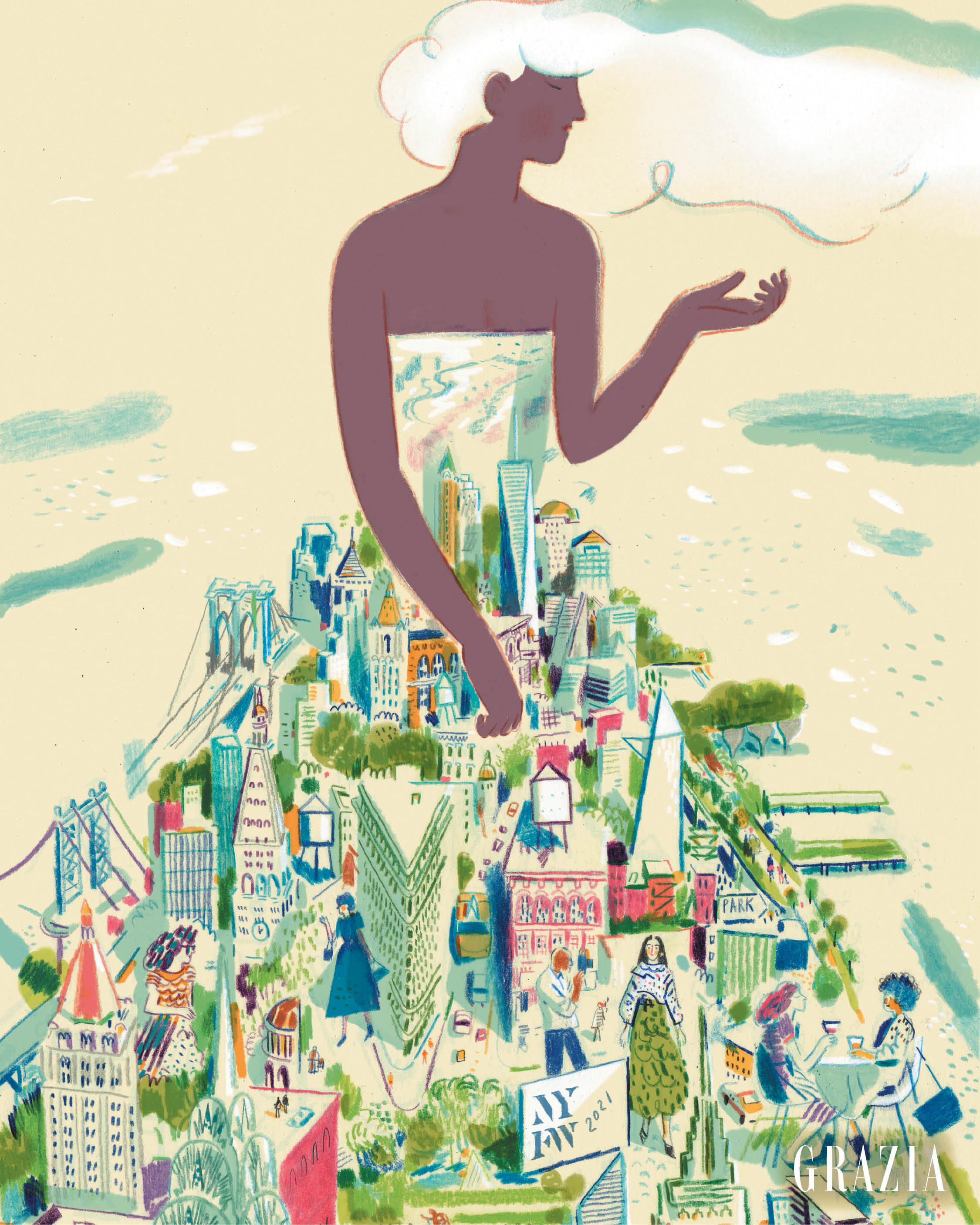

This past summer IMG and the CFDA (the two powerful entities that oversee New York Fashion Week) issued a joint communiqué emphasizing that they are working “hand in hand” to present the shows and events this season: running from September 8, when Ulla Johnson kicks it off at 9 that morning, to September 12, when it all builds to a closing night with Tom Ford’s presentation at 8 p.m. As NYFW renews itself and rebuilds its concept of live events in a post-pandemic social media world, a cooperative spirit is integral to its American one, which is celebratory and inclusive. The two companies are leading by example. Indeed, when I mentioned to Steven Kolb, CEO of the CFDA (Council of Fashion Designers of America), that I was writing a profile of Leslie Russo, President of Fashion Events and Properties for IMG (the International Management Group, not that anyone ever calls it that), he raved about her, kvelling even as he used the careful cadence of corporate-speak to do it.
“Leslie is the consummate pro during the often-chaotic process of planning New York Fashion Week. She’s also a great friend and ally in our shared mission to represent American fashion at its very best on the global stage,” he said. “We are both driven by our shared interest in maximizing opportunities for our talented designers. In any creative field and especially fashion, this can be quite complicated, but Leslie navigates our world effortlessly.”
For Russo, leading by example is in her personal and professional DNA: She is the niece of Vito Russo, the legendary film historian and LGBTQ activist who died of AIDS in 1990. “Vito was a giant in his activism, but also in our family,” she told me, a mother now herself of two sons, ages 12 and 15. “His influence has pervaded every area of my life, helping to define my character, my principles, my outlook, my interests, and my personality, all from a very young age. His legacy as a champion for equality is more relevant and important than ever in our world today.”
Right out of college, she got a job at Andy Warhol’s Interview, where she was mentored by Ingrid Sischy, its beloved late editor in chief who died of breast cancer in 2015. Her two most important mentors succumbed to two health scourges that still stalk us as a society and, more importantly, helped build the industry that she now helps lead from her corporate perch at IMG.
“I was the ‘events girl,’” Russo said, describing that first job she had at Interview with an egalitarian, self-deprecating aplomb when we spoke via Zoom back in July. Such aplomb is one of the secrets of her success. I worked at Interview as its executive editor for a couple of years before Russo arrived but we agreed we each looked on our roles there as having held “factory jobs.” That pun instilled in us a real work ethic about steering culture even as we were stirred by it. “We learned to be stevedores of glamour,” I kidded her.

Russo laughed—there is an ease to her laughter that belies the seriousness with which she takes her corporate role, laced as it is with the deeper timbre that loss has layered into it—and remembered her own early days learning how, as Kolb so keenly observed, to navigate effortlessly the larger world of New York City by navigating the hallways of Interview. “I love that you put it that way,” she said. “You’re right. We’re stevedores of glamour. People always say, ‘You’re in this big job.’ I never aspired to be in a big job. I never aspired to have a big career. I really loved the work. I love the ‘getting my hands dirty and making things.’ That to me has always been the part that has been the most motivating. As the doors kept opening, I kept going through.”
“When I was at Interview, it was the time when publishing was the hottest industry to be in. So, I feel like that was the best training ground,” she continued, recalling her 15 years at Condé Nast, where she oversaw a rotating array of brands, including Glamour, Details, W, and Brides. “That experience at Interview really shaped how I approach my work in general. You know how it was there. It was part magazine, part art project. It wasn’t like a formal office environment, but it was a really tough learning ground.”
“Ingrid was an incredible person to learn from. She taught me a lot,” Russo recalled. “There was this one day when I went to the copier and David Bowie was in front of me making a photocopy. Julian Schnabel was in the library. And as I was going out to Dean & DeLuca to get myself something for lunch, I ran into Ingrid who had scribbled a note and handed it to me. I still have the note. She wrote, ‘Stefano and Domenico are coming to lunch and you have to pick up something for them to eat.’” Russo laughed again, referencing Dolce & Gabbana in the familiar way they were referenced when Ingrid scribbled down their names for her in her almost illegible script. “I realized, Ohmygod. This is where all these things intersect. You felt as if culture was happening and being made in real time.”
Today, that experience continues for Russo, albeit in a different way. “I work at Endeavor,” she said, now referencing IMG’s corporate parent, the segue as graceful as her corporate rise itself. “It’s a big company, but it’s that on steroids. It’s a modern media company at its most evolved. We have talent, events, sports, arts, culture, fashion, models—all of that. It’s like sitting in the middle of all of it and figuring out, How do you connect the dots? There is a sense of constantly creating culture. So, I do think there is similarity there.”
Russo and IMG will be reconnecting the dots of an industry shaken by crisis during NYFW from the hub of Spring Studios. “The pandemic is giving an inflection point to this long evolution we’ve been experiencing.… So now we are at ‘What is the reason for Fashion Week?’” she admitted. “It’s a balancing act. It comes down to really simple things.” One of which is the IMG Fashion Alliance, a new initiative intended to spotlight independent and emerging talent, the next generation.
“That’s who people are excited to see—these brands that are up and coming and that have huge followings on social media and are becoming part of the cultural consciousness,” she said.
At the same time, even legacy brands are redefining themselves in the light of the post-pandemic dawning, a cultural moment that Russo is grateful to both experience and celebrate. “There is also this sense of freedom. There are no rules,” she explained. “What works for one designer who’s really established doesn’t work for another. I don’t think there’s a certain way you have to show or present your collection. I think there’s all these different ways that people are servicing their businesses. So freedom is an important word. And joy is the feeling of it.”













